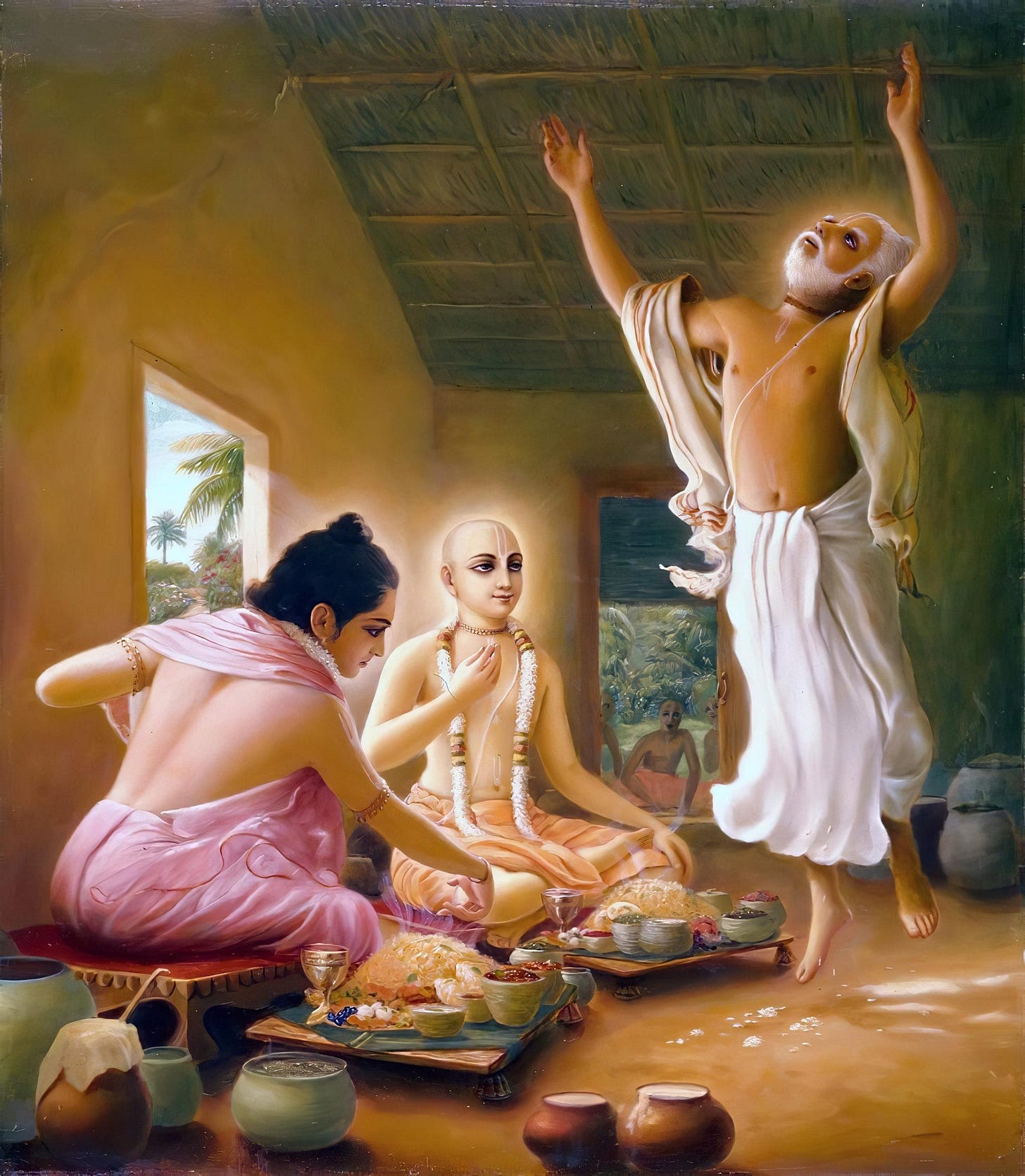Further arguments
By following the rituals prescribed in the karma-kanda section of the Vedas, one can obtain pious material benefits, but such results are very limited and temporary. This is confirmed in many passages
« Vedānta-sūtra: The Govinda-bhāṣya of Baladeva Vidyābhūṣaṇa
« Sutra 1.1.1 - athāto brahma-jijñāsā (Beginning of the topic)
Further arguments
One difficulty in understanding the correct meaning of the verses of the scriptures is that Sanskrit words can be interpreted in different ways, and according to the interpretation, the meaning of the verses changes. This is a topic that is dealt with in many different passages of the Govinda-bhāṣya. This specific sūtra, athāto brahma-jijñāsā, is composed of just four words (atha, ataḥ, brahma, jijñāsā), and the meaning is quite straightforward. Still, at least two objections could be raised to the meaning of the words.
The first is that one could argue that words such as “om” and “atha” are often used at the beginning of books to invoke auspiciousness and drive away obstacles, being auspicious sounds that emanated from the throat of Lord Brahma in ancient times. One could try to sustain this idea using the following reference:
oṃkāraś cātha-śabdaś ca dvāv etau brahmaṇaḥ purā
kaṇṭhaṃ bhittvā vinirjātau tena māngalikāv ubhau“Om and atha came from the throat of Brahmā in ancient times. Hence, both are regarded as auspicious.”
If we accept this interpretation, the word “atha” has no special meaning, and the sūtra becomes just a generic instruction for philosophical search, without any particular cause or urgency.
However, Sri Baladeva disagrees with this interpretation:
“To this objection I reply: This is not true. Śrīla Vyāsadeva, the author of Vedānta-sūtra, is the incarnation of the Supreme Personality of Godhead Himself, and therefore does not need to invoke auspiciousness or drive away obstacles and dangers.”
Therefore, the words atha and ataḥ are used at the beginning of the sūtra purposefully to indicate sequence and consequence (now, therefore), and not simply as empty ritual words. At a certain point in time, after attaining certain qualifications (a human birth, education, etc.), a person comes to the point of inquiring about Brahman, and such inquiring brings one to the stage of understanding the Supreme Lord and reawakening one’s eternal spiritual nature, which is the ultimate goal of human life.
The fact that Vyāsadeva is the Supreme Personality of Godhead is confirmed by the following statement of the smrti-sastra:
kṛṣṇa-dvaipāyana-vyāsam viddhi nārāyaṇam prabhum
“Know Kṛṣṇa Dvaipāyana Vyāsa to be none other than Sri Nārāyaṇa, the Supreme Personality of Godhead.”
The four Vedas, as well as the Upaniṣads, are called sruti (that which is heard), being part of the original Vedic knowledge, while the Purāṇas, Mahābhārata, etc., as well as the Bhagavad-gītā, are called smṛti (that which is remembered) because they are scriptures composed later based on the teachings of great sages. This particular quote, for example, comes from the Mahābhārata (12.334.9)
The entire verse is:
kṛṣṇadvaipāyanaṃ vyāsaṃ viddhi nārāyaṇaṃ prabhum
ko hyanyaḥ puruṣavyāghra mahābhāratakṛdbhavet
dharmānnānāvidhāṃścaiva ko brūyāttamṛte prabhum“Know Kṛṣṇa Dvaipāyana Vyāsa to be none other than Sri Nārāyaṇa, the Supreme Personality of Godhead. Who else, O tiger among men, could be the author of the Mahābhārata? Who else, besides the Lord, could expound the various kinds of dharma for the observance and adoption of men?”
This verse appears in the Śānti-parva, a very long book with the teachings of Bhīṣmadeva to Maharaja Yudhiṣṭhira while on the bed of arrows. Just as in the Śrīmad-Bhāgavatam, the Mahabharata has several layers of narratives. The whole epic is narrated by Ugraśravā Sauti (Suta Gosvāmī) to the sages at Naimiṣāraṇya, who describe the teachings of Vaiśampāyana to King Janamejaya during his snake sacrifice. During most of the Śānti-parva, Vaiśampāyana describes the teachings of Bhīṣmadeva to Maharaja Yudhiṣṭhira, but in this particular passage, he interrupts the narration to extol the qualifications of Vyāsadeva as not just an ordinary author, but as the Supreme Personality of Godhead Himself.
Next: Further arguments »
« Vedānta-sūtra: The Govinda-bhāṣya of Baladeva Vidyābhūṣaṇa



My answer would be "What is the meaning of the 'perfection' you speak of, and how do you know it is eternal?"
Pretty useful information.